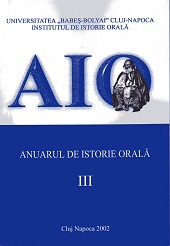Războiul din Afghanistan (1979-1989) în memoria combatanţilor. Cazul participanţilor din comuna Echimăuţi, jud. Orhei, Rep. Moldova
The Afghanistan War (1979-1989) to the Combatants' Memory. The Case of the Participants form Echmănuţ Village, in Orhei County, Moldavia Rep.
Author(s): Ion Valer XenofontovSubject(s): History
Published by: Argonaut
Summary/Abstract: The post-war world's history has been touched by a series of factors: the technical-scientific revolution, the new world's political configuration, and the Cold War. By globalizing issues and carrying out certain projects at an international level, a basis to interstate relations has been built. Moreover there has been created, at the same time, a world bipolarity based on antagonist criteria. In the late '70s, mankind was confronting a complex scale of contrasts: peace-war, capitalism-communism, bourgeoisie-proletariat. The political aspect was deeply implied within all these, sometimes throughout rough methods, and military force seemed to be one of the solutions that could solve the disputes. During the second half of the '70s, tension between USA and USSR increased; the Great Powers' interests in the Third World increased also, so that certain conflicts arose, such as the one generated by the Soviet intervention in Afghanistan. Due to its close vicinity to USSR and being an important geo-political area, Afghanistan was all the time situated within Kremlin's interest area. Nevertheless, the latter didn't use force till the end of the '70s. In 1979 Kremlin applied a military plan that had absolutely nothing to do with the political reality. The military intervention in Afghanistan generated a major intemational crisis and a substantial decay of the Soviet Union prestige. The Soviet Union was now considered an aggressor state. The financial efforts that this war consumed deepened more and more the social economical crisis that the Soviet Union was passing through, finally leading to its dissolution. The War in Afghanistan mobilised an important section of the Soviet army. If during the first war phase (the late '70s - the early '80s) the basis contingent consisted in soldiers from the Asian ex-republics (Tajiks, Uzbeks) during the second one the role of the USSR's occidental-area soldiers (Romanians from Bessarabia, Russians, Byelorussians, Ukrainians) increased. The Bessarabian combatants encountered an absolutely unknown world to them, on a foreign state's territory that had particular geographical conditions, all these affecting them deeply. The tragedy of the Soviet combatants in Afghanistan may be resumed by quoting Victor Botnari - a Bessarabian veteran - who concluded: "Those who served in Afghanistan should be proud of it, those who didn't should consider themselves happy..."
Journal: Anuarul Institutului de Istorie Orală
- Issue Year: 2002
- Issue No: III
- Page Range: 334-369
- Page Count: 36
- Language: Romanian

